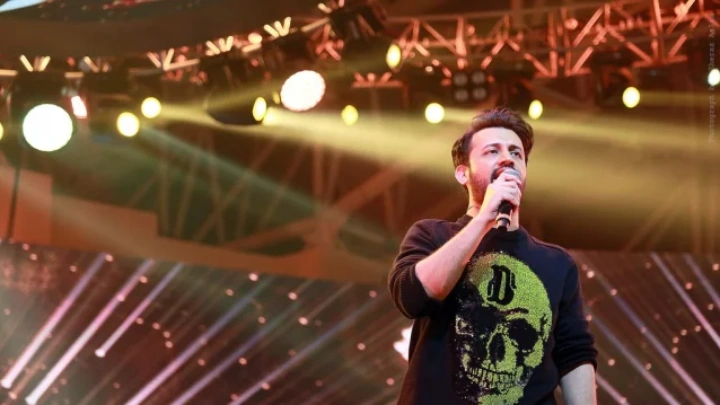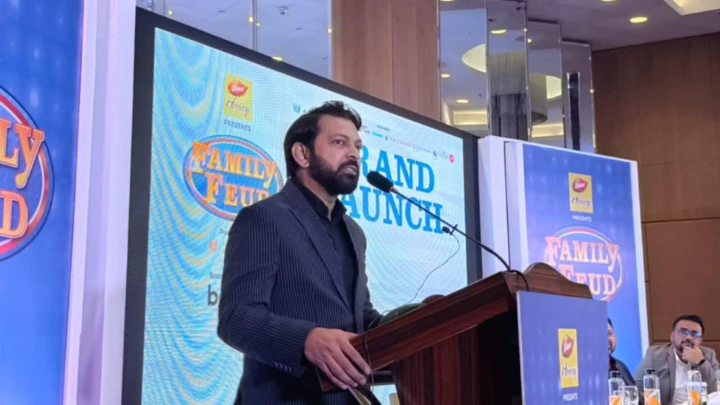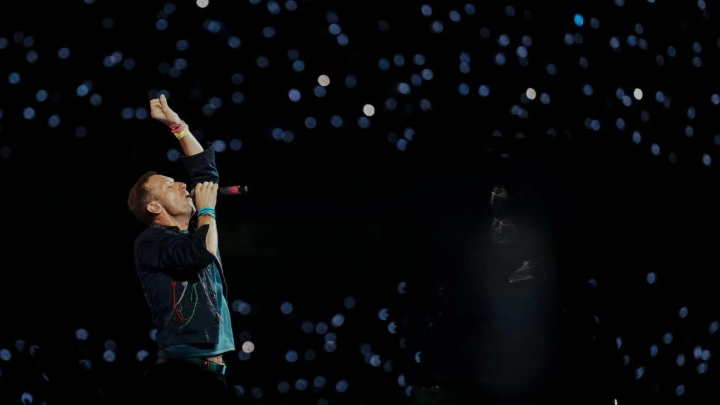Pakistani musical virtuoso Atif Aslam played his first show in Bangladesh in 11 years with an unforgettable three-hour-long set on 19 April
The time Atif A-slam dunked through the night
TBS || Shining BD
It was well past 11 pm, and Atif Aslam had been commanding the stage for nearly two hours straight with the temperature stubbornly hovering around 40 degrees Celsius.
He had paused only briefly, a mere 10 minutes after the first hour and a half. Despite the thick air and fervent chants from the audience, not a hint of fatigue was noticeable in Atif's voice.
The anticipation hung heavy as the crowd still awaited their most cherished songs. It was then that Atif asked the thousands in attendance—somewhere between 25,000 and 30,000 fans—with a playful taunt: "What are you waiting for?".
He knew what they wanted but even before they could voice their request, Atif began singing some verses of 'Tu Jaane Na.' His bare voice, clear and unaccompanied save for the soft strains of a harmonium in the background, cut through the night.
Rejuvenated as if by some spell, the crowd responded, their voices soaring high and strong, filling the vastness of the open-air Bashundhara Sports Complex cricket stadium. It was a mesmerising scene, thousands of voices in unison with Atif's simple accompaniment, a moment of pure connection. Yet, unknown to them, the night still held surprises, ones as splendid as they were unexpected.
Interestingly, the song that received the most requests and chants was not 'Tu Jaane Na' but 'Aadat'—one of Atif's breakthrough tracks from two decades ago.
Atif did not disappoint.
After more than two hours, they finally basked in the beautiful melodies of 'Aadat,' arguably his most iconic song. What makes such timeless songs truly captivating is the uniqueness of their live performances—presented differently from their studio versions. This rendition was more upbeat, but it was the deliberate pauses Atif allowed, giving space for the audience to join in with their own renditions, that created a fully immersive experience for both the artist and his fans.
The song's famous 'alaap' sections, a signature of Atif, were a particular delight. Remarkably, even after hours of performing, his voice stayed pitch-perfect. During the 'alaap,' Atif wasn't alone; the entire audience endeavoured to match his vocal prowess, creating a harmonious unity rarely witnessed on such a scale (no pun intended).
If you thought the night had reached its end, you would be mistaken, as were the approximately 10,000 attendees who hurriedly left the venue when the stage and screens went all 'fade to black,' believing the concert had finished. Little did they know, the best was yet to come.
After a brief five-minute break, Atif reappeared, much to the surprise and delight of those who had remained. This final segment of the concert didn't focus on his mainstream hits. Instead, the last 40 minutes were dedicated to a soul-stirring medley of Sufi and Qawwali songs, interspersed with occasional cover numbers.
Among these, A R Rahman's "Kun Faya Kun" stood out.
During this part of the show, it felt as if Atif wasn't performing for the audience but for himself, reconnecting with his musical roots. His voice, more powerful than ever, filled the stadium, showcasing his impressive vocal range. Yet, Atif wasn't ready to leave Dhaka without a final surge of energy.
He chose 'Hum Kis Gali Ja Rahe Hain' for his last song of the night—a perfect rock number to cap off a three-hour performance. The remaining crowd, around 20,000 strong, defied their exhaustion and dehydration, jumping and singing with all the energy they could muster.
Atif interacted with the audience, throwing in ad-libs reminiscent of those used by Freddie Mercury, which were met with enthusiastic responses. As the clock neared midnight, he blew kisses in gratitude to those who had stayed, leaving the stage after a night that none would soon forget.
Over the past 18 months, audiences in Bangladesh have experienced performances from several international artists. While many of these concerts ended in disappointment, Atif Aslam's concert did not. In fact, far from a disappointment, it set the bar high.
Unlike others such as Anuv Jain, who performed for just over 40 minutes, Atif delivered a marathon three-hour set. Despite the oppressive heat wave in Dhaka, which was as challenging for him as it was for the audience, his performance left no room for complaints. No one walked away feeling let down about not hearing their favourite song.
It's hard to keep an exact count, but Atif performed around 30 songs, incorporating some legendary cover numbers of the likes of Lata Mangeshkar and Runa Laila amongst others, into his segments alongside his original hits.
Atif skillfully avoided monotony by varying the tempo and style of his performances. For about half of the time, he offered softer, more melodic ballads, weaving his original songs with covers in a way that continually surprised and delighted the audience.
A standout moment came when Atif performed 'Pehli Nazar Mein,' a song deeply cherished by his fans. After cycling through the chorus and verses a few times, he seamlessly shifted into 'Pehla Nasha,' another romantic classic, stirring an ecstatic response from the crowd. He didn't stop there; he smoothly transitioned into the Hindi rendition of '500 Miles,' reimagined as 'Jab Koi Baat Bigad Jaaye,' further captivating his audience with this thoughtful blend of melodies from different eras.
Atif knew well the devotion of his fans in Bangladesh, and throughout his performance, he actively engaged with them. A lucky few experienced the thrill of being called onto the stage by the singer. It was clear from the exchange of hugs and heartfelt gestures that Atif deeply appreciated his fans, reciprocating their affection generously.
Even when things escalated—with some overeager fans barging onto the stage for a selfie or a handshake while he was performing—Atif showed no signs of irritation. Instead, he welcomed them with open arms. He made sure that security handled the situation gently, allowing these fans to return to the crowd with unforgettable memories, rather than rebukes.
I could talk endlessly about the concert, much like Atif's seemingly tireless performance that night, and still perhaps not fully capture the brilliance and flawlessness of his delivery. The virtuosity displayed, not only by Atif but also by his accompanying flautist and pianist, was extraordinary, fully justifying the high ticket prices.
None of the many concerts I have attended in the past decade have left me as thoroughly satisfied as this one. If Atif Aslam were never to perform in Bangladesh again, that would be fine really, because I do not see him – or anyone for that matter – to top the performance on the night of 19 April 2024.
Shining BD
























